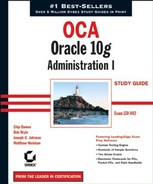6.10. Review Questions
Which of the following types of statements can use a temporary tablespace?
An index creation
SQL statements with a GROUP BY clause
A hash join operation
All of the above
Which of the following statements gives user desmond the ability to alter table gl.accounts?
grant alter on gl.accounts to desmond;
grant alter to desmond on gl.accounts;
grant alter table to desmond;
allow desmond to alter table gl.accounts;
Which of the following statements gives user desmond the ability to alter table gl.accounts as well as give this ability to other accounts?
grant alter any table with grant option to desmond;
grant alter on gl.accounts to desmond with admin option;
grant alter any table to desmond with grant option;
grant alter any table to desmond with admin option;
The following SQL statement will allow user regina to perform which operations on sequence oe.orders_seq?
GRANT ALL ON oe.orders_seq TO regina;
Select the next value from oe.orders_seq.
Alter sequence oe.orders_seq to change the next value.
Change the number of sequence numbers that will be cached in memory.
Both A and C.
All of the above.
User system granted SELECT on sh.products to user ian using WITH GRANT OPTION. Ian then granted SELECT on sh.products to user stuart. Ian has left the company, and his account is dropped. What happens to Stuart's privileges on sh.products?
User system granted SELECT ANY TABLE to user ian using WITH ADMIN OPTION. Ian then granted SELECT ANY TABLE to user stuart. Ian has left the company, and his account is dropped. What happens to Stuart's privileges?
Stuart loses his privileges.
Stuart retains his privileges.
Stuart loses his privileges if Ian was dropped with the CASCADE REVOKE option.
Stuart retains his privileges if Ian was dropped with the NOCASCADE REVOKE option.
Which of the following system privileges can allow the grantee to masquerade as another user and therefore should be granted judiciously?
CREATE ANY JOB
ALTER USER
CREATE ANY PROCEDURE
All of the above
Which of the following statements enables the role user_admin in the current session?
alter session enable role user_admin;
alter session set role user_admin;
alter role user_admin enable;
set role user_admin;
Which of the following SQL statements allows user augustin to use the privileges associated with the password-protected role info_czar, which has been granted to him?
set role all;
alter user augustin default role all;
alter session enable role info_czar;
alter session enable info_czar identified by brozo
By default, how much tablespace can any account use for a new table?
None
Up to the current free space in the tablespace
Unlimited space, including autoextends
Up to the default quota established at tablespace creation time
Which of the following prevents a user from reusing a password when they change their password?
Setting the initialization parameter NO_PASSWORD_REUSE to TRUE
Altering that user's profile to UNLIMITED for PASSWORD_REUSE_TIME and 1 for PASSWORD_ REUSE_MAX
Altering that user's profile to UNLIMITED for both PASSWORD_REUSE_TIME and PASSWORD_ REUSE_MAX
Using a password verify function to record the new password and compare the new passwords to those recorded previously
How can you prevent someone from using an all-numeric password?
Set the initialization parameter PASSWORD_COMPLEXITY to ALPHANUM.
Alter that user's profile setting PASSWORD_COMPLEXITY to ALPHNANUM.
Alter the user's profile to use a password verify function that performs REGEX comparisons to validate the password.
There is no mechanism that lets you prevent an all-numeric password.
Which of the following is not an object privilege on a table?
SELECT
DEBUG
REFERENCES
READ
Which of the following statements about user administration and security is the most true? Select the best answer.
Password-protected roles require a password before they can become enabled.
You can disable any role that you find in your session_roles view.
If you execute alter profile student limit idle_time 10; and then execute alter user scott profile student;, then user scott will be disconnected from future sessions after 10 minutes of idle time.
You can limit a table to a maximum size on disk.
Which of the following SQL statements limit attempts to guess passwords by locking an account after three failed logon attempts?
alter profile default limit failed_login_attempts 3;
alter system set max_logon_failures = 3 scope=both;
alter user set failed_login_attempts = 3;
alter system set failed_login_attempts = 3 scope=both;
Where can the database write audit_trail records?
In a database table
In a file outside the database
Both in the database and in an operating system file
Either in the database or in an operating system file
Which of the following activities can be audited?
Unsuccessful deletions from the audit_trail table
Unsuccessful selects from the employee_salary table
All GRANT and REVOKE statements on procedures executed by user system
All of the above
How do you manage fine-grained auditing?
With the AUDIT and NOAUDIT statements
With the DBMS_FGA package
With the GRANT and REVOKE statements
With the CREATE, ALTER, and DROP statements
